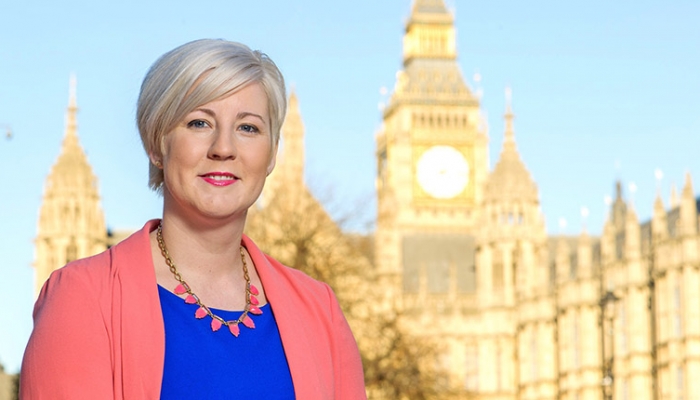Hannah Bardell MP: Good and proper healthcare must be available for everybody in the LGBT community
Scottish National Party MP Hannah Bardell writes following her House of Commons debate on lesbian, bisexual and trans women’s health inequalities.
I came out literally as I was being elected, initially to myself, then later to my family and friends and publicly sometime after that, and that was challenging. It is fair to say that the impact on my mental health was profound.
For me, and for many other people coming out later in life, there is an element of regret and, in fact, mourning for a life not lived as my authentic self and it is hard to describe what that feels like. I try very hard to look forward – to make the most of what is in front of me, not to look back and have regrets that I was not living my life as my true self. There are many reasons why people come out later in life, and there is also much research around the profound impact that that has on people’s mental and physical health.
Coming out as lesbian, gay or bisexual can be a very different experience from coming out as trans. I cannot imagine how incredibly difficult that is, particularly in the current climate. We owe it to our trans and non-binary citizens to support them and ensure that discussion around changes in legislation or any matters relating to their lives and healthcare is conducted in a respectful and decent way.
We know the LGBT community, including lesbian, bi and trans women, experience significant health inequalities and specific barriers to services and support, and are sadly at a higher risk of experiencing common mental health problems than the general population.
The Science and Technology Committee report states that there is ’emerging evidence demonstrates that lesbian, gay, bisexual and trans (LGBT+) people experience significant health inequalities across their lifespan, often starting at a young age.’
Stonewall Scotland’s survey of LGBT people in Scotland found that half had experienced depression in the past year, including seven in 10 trans people, and that more than half of trans people have thought of taking their own life in the past year.
Stonewall Scotland’s survey of LGBT people in Scotland found that:
- Half of LGBT people (49 per cent) have experienced depression in the last year, including seven in ten trans people (72 per cent).
- More than half of trans people (52 per cent) have thought of taking their own life in the last year.
- One in six LGBT people (16 per cent) have deliberately harmed themselves in the last year.
- One in four LGBT people (24 per cent) have witnessed discriminatory or negative remarks against LGBT people by healthcare staff.
- One in eight LGBT people (13 per cent) have received unequal treatment from healthcare staff because of their sexual orientation or gender identity.
- Almost two in five trans people (37 per cent) have avoided healthcare treatment for fear of discrimination.
- One in four LGBT people (27 per cent) have experienced healthcare staff having a lack of understanding of specific lesbian, gay and bi health needs.
- Nearly three in five trans people (59 per cent) have experienced healthcare staff having a lack of understanding of specific trans health needs.
I understand that some of these matters are very technical. They are challenging and they require a level of expertise. That is why education, open discussion and proper resourcing in Scotland and across the UK is absolutely vital. We know how incredibly hard staff in the NHS work in all countries and parts of the UK. We salute them. However, the studies show that there is a bit more work to be done.
In 2013, a study in the USA said, unsurprisingly, that legalising gay marriage might improve health and reduce healthcare costs. Another similar study last year found that legalising equal marriage could improve the mental health of same-sex couples. Wow — what a revelation! You can marry the person you love and live the life you want as the person you are, and it might actually make you happy and reduce the burden on the healthcare system.
We know that legislative change does not in itself necessarily change culture or fix the problem, but it is an important step.
The specific health needs of disabled people who are also LGBT are often overlooked by healthcare professionals. According to Stonewall, which has produced some compelling briefings on the subject, disabled people in the LGBT community can be left with a lack of trust in their healthcare providers. Multiple needs are often not taken into account, which affects some of the most vulnerable people. LGBT people are not necessarily open about their sexual orientation and/or gender identity when seeking medical help, because of a fear of unfair treatment and invasive questioning.
Stonewall goes on to talk specifically about issues around PIP assessments and it has said that one in five non-binary people and LGBT disabled people have experienced discrimination. Similarly, one in five black, Asian and minority ethnic LGBT people, including 24% of Asian LGBT people, have experienced it.
There is still a long way to go and debates such as this one are part of the picture of making sure that good and proper healthcare is available for everybody in the LGBT community. We as MPs must do everything we can to make sure that no one suffers from poor mental or physical health just because of their gender, sexuality or gender identity.
We are all equal. At the end of the day, we are all human.
Hannah Bardell is a member of the SNP’s Shadow Foreign Affairs and International Development teams and the MP for Livingston.
This blog post is part of a cross-party series on Vuelio’s political blog Point of Order, which publishes insight and opinion to help public affairs, policy and comms professionals stay ahead of political change and connect with those who campaign on the issues they care about. To find out more or contribute, get in touch with Vuelio Politics.







Leave a Comment